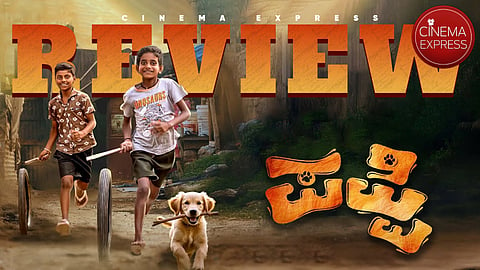

At first glance, Puppy might seem like just a simple, sweet story about a lost dog. But the film offers a sincere look at migration, innocence, and the realities of life for village families in the city. It is a story packed with meaning. The plot follows a group of families from Raichur, North Karnataka, who travel to Bengaluru as construction workers, hoping for better opportunities. We see the little things—dry chapatis packed for the road, kids doing math to count costs—that show the effort and planning that go into such a move. These details feel real and grounded.
The story is mostly told through the eyes of children. Parshya (Jagadeesh) and Aadi (Aditya) meet at school in Bengaluru and quickly become close friends. Their friendship feels natural—full of jokes, mischief, and quiet support. Parshya’s parents, Durgappa and Renuka, are construction workers. They work hard, say little, and live with quiet pride. Durgappa believes in work as worship—a value that runs through the family. Their life is not easy, but it’s honest. The extended group of workers from the same village brings warmth and a sense of community. All of this is captured well—in run-down houses, messy surroundings, and even the continued practice of going in the open field to relieve themselves due to lack of toilets.
Director: Ayush Malli
Cast: Aditya G, Jagadeesh K, Durgappa Kambli, Renuka Desai, and Aarav Lohith
The scenes where the boys explore Cubbon Park, see the Vidhana Soudha, and try to understand the city’s symbols show us how village children see the urban world—full of wonder but also confusion. Their small pigeon-selling plan is another key moment—they see pigeons as symbols of freedom, but one buyer refuses to let the bird fly. This moment challenges their beliefs in a way that stays with you.
When the boys find the missing dog poster, it creates a turning point. A ₹10,000 reward is announced for the dog, Puppy. For these children, whose families work all day for far less, the idea of such a reward is shocking. It raises quiet but strong questions about what is truly valued in a city like Bengaluru. At first, the two friends who go out to find the dog succeed in their mission and try to return it. But then Parshya has other plans and quietly switches off his father’s phone. What does this mean? Is it a small act made out of confusion, or something deeper? The film doesn’t explain—it lets us think.
The pandemic also makes a quiet appearance—not through dramatic scenes with masks, but through posters of Dia and Love Mocktail 2, hinting at the time period. COVID-19 once again pushes migrant workers to leave the city for their villages, showing how fragile their dreams really are.
However, the film does have its weak points. The bond between the boy and the dog feels rushed. Since Parshya spends only two days together, the emotional connection isn’t strong enough to carry the final scenes. While the film tries to be heartwarming, the short time frame makes the ending feel a bit forced.
As for the performances, most of the actors are non-professionals from North Karnataka, and their natural way of speaking and behaving brings honesty to the screen. The only time the film feels less real is during the climax, where it tries to add drama that doesn’t quite fit the rest of the story.
Director Ayush Malli brings together a story that is simple, yet quietly moving. While it doesn’t fully explore the deeper emotional layers of migration or the children’s inner worlds, it still gently reveals the silent struggles and small hopes that shape life on the margins of a growing city.
Puppy is not just about a lost pet—it’s about people, especially those who are too often unseen. It’s about the things they quietly lose, carry, and hope for. In the middle of city noise and rush, the film reminds us to notice the lives that pass silently—because sometimes, those lives hold the most meaning. With a little more emotional depth, Puppy could have left an even stronger mark.